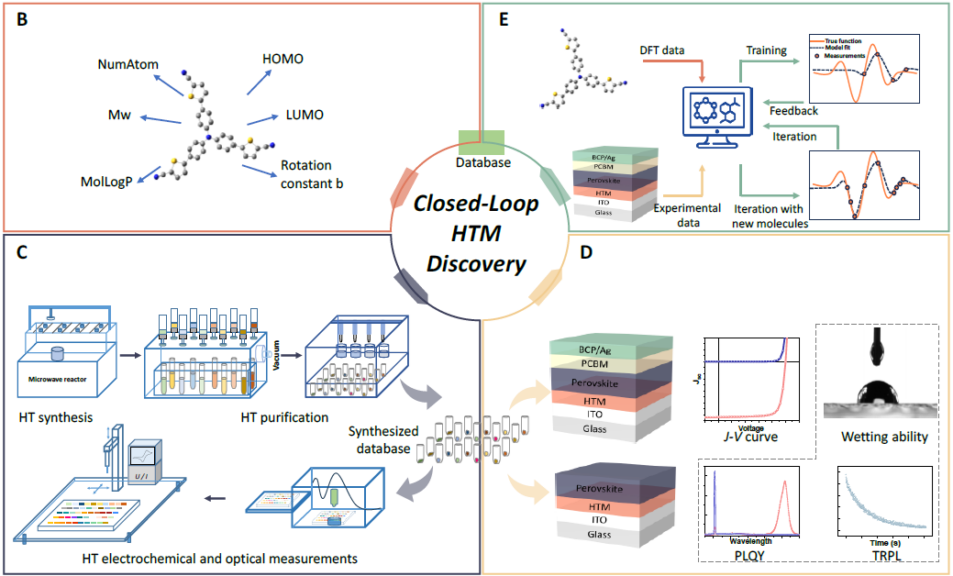Wu, J., Torresi, L.†, Hu, M.†, Reiser, P.†, Zhang, J., Rocha-Ortiz, J.S., Wang, L., Xie, Z., Zhang, K., Park, B.-w., Barabash, A., Zhao, Y., Luo, J., Wang, Y., Lüer, L., Deng, L.-L., Hauch, J.A., Guldi, D.M., Pérez-Ojeda, M.E., Seok, S.I., Friederich, P., Brabec, C.J.
Science, 386(6727), 1256-1264
The inverse design of tailored organic molecules for specific optoelectronic devices of high complexity holds an enormous potential but has not yet been realized. Current models rely on large data sets that generally do not exist for specialized research fields. We demonstrate a closed-loop workflow that combines high-throughput synthesis of organic semiconductors to create large datasets and Bayesian optimization to discover new hole-transporting materials with tailored properties for solar cell applications. The predictive models were based on molecular descriptors that allowed us to link the structure of these materials to their performance. A series of high-performance molecules were identified from minimal suggestions and achieved up to 26.2% (certified 25.9%) power conversion efficiency in perovskite solar cells
The authors acknowledge the generous support of the STAEDTLER Foundation, which funded this work as part of the project Accelerated Innovation for a Sustainable Solar Energy Future.

Wu, J., Torresi, L.†, Hu, M.†, Reiser, P.†, Zhang, J., Rocha-Ortiz, J.S., Wang, L., Xie, Z., Zhang, K., Park, B.-w., Barabash, A., Zhao, Y., Luo, J., Wang, Y., Lüer, L., Deng, L.-L., Hauch, J.A., Guldi, D.M., Pérez-Ojeda, M.E., Seok, S.I., Friederich, P., Brabec, C.J.
Science, 386(6727), 1256-1264
The inverse design of tailored organic molecules for specific optoelectronic devices of high complexity holds an enormous potential but has not yet been realized. Current models rely on large data sets that generally do not exist for specialized research fields. We demonstrate a closed-loop workflow that combines high-throughput synthesis of organic semiconductors to create large datasets and Bayesian optimization to discover new hole-transporting materials with tailored properties for solar cell applications. The predictive models were based on molecular descriptors that allowed us to link the structure of these materials to their performance. A series of high-performance molecules were identified from minimal suggestions and achieved up to 26.2% (certified 25.9%) power conversion efficiency in perovskite solar cells
The authors acknowledge the generous support of the STAEDTLER Foundation, which funded this work as part of the project Accelerated Innovation for a Sustainable Solar Energy Future.